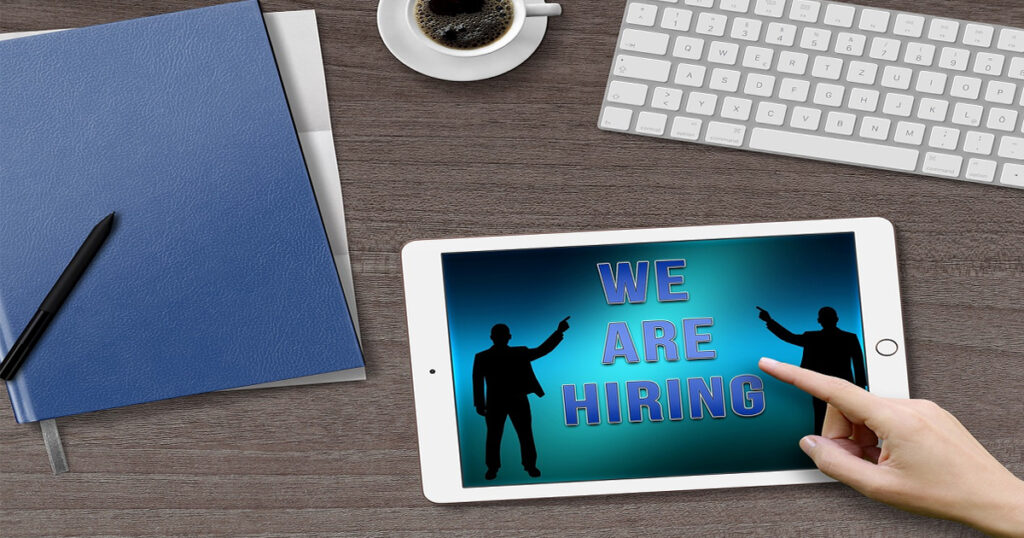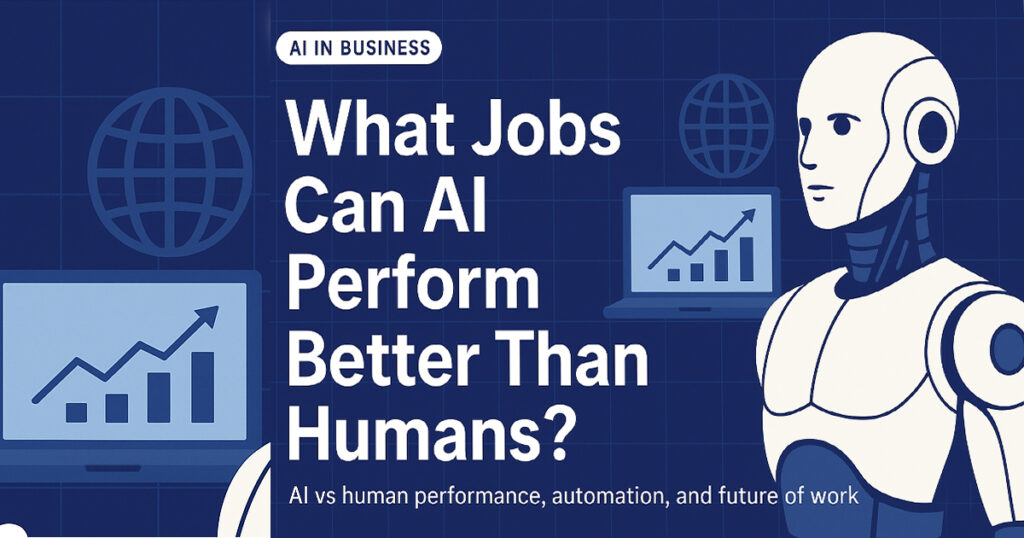What Jobs Can AI Perform Better Than Humans?

Introduction
Artificial Intelligence (AI) is no longer a futuristic concept—it’s a reality shaping today’s industries and workplaces. From business operations to healthcare, AI is outperforming humans in specific tasks that require speed, accuracy, and large-scale data processing. This shift is raising important questions: What jobs can AI actually do better than humans? In this article, we’ll explore AI jobs, artificial intelligence in business, AI vs human performance, automation and AI, and the future of work with AI to understand how the world of work is being transformed.
AI Jobs: The Changing Role of Work
AI is taking over many tasks that were once exclusively done by humans. Some of the most notable AI-driven jobs include:
-
Data Processing and Analysis: AI can handle millions of records in seconds, something humans would take weeks to complete.
-
Customer Service Chatbots: Virtual assistants are available 24/7, answering repetitive queries instantly.
-
Healthcare Imaging: AI-powered systems can detect patterns in X-rays or MRIs faster and often more accurately than human doctors.
-
Fraud Detection: In banking and finance, AI can analyze unusual patterns in transactions far more efficiently than humans.
These examples show how AI is shifting the job landscape, allowing humans to focus on creativity, strategy, and innovation.
Artificial Intelligence in Business
Businesses around the world are embracing AI for efficiency and growth. Some key areas include:
-
Marketing Automation: Personalized ads, email campaigns, and customer segmentation are now AI-driven.
-
Supply Chain Optimization: AI forecasts demand, manages inventory, and reduces delivery delays.
-
Financial Insights: AI helps businesses predict risks, manage investments, and improve decision-making.
-
Human Resource Management: From screening resumes to employee performance tracking, AI is reshaping HR departments.
For companies, AI is not just a cost-saving tool—it’s a competitive advantage that drives better customer experiences and long-term profitability.
.

AI vs Human Performance
While humans are creative, empathetic, and flexible, AI beats us in areas that require:
-
Speed: AI processes information in microseconds.
-
Accuracy: Machines eliminate human error in repetitive tasks.
-
Consistency: Unlike humans, AI doesn’t get tired or distracted.
-
Scalability: AI can handle millions of operations at once, while humans are limited by time and capacity.
However, there’s one area where humans always win—emotional intelligence and creativity. AI may assist in generating ideas, but it cannot truly innovate or empathize like a human mind.
Automation and AI: Redefining Workflows
Automation powered by AI is redefining how industries operate. Manufacturing, logistics, and even content creation are seeing massive transformation. Examples include:
-
Automated Manufacturing: Robots assemble products with precision and speed.
-
Smart Logistics: AI manages supply chains, reduces costs, and ensures on-time deliveries.
-
Content Generation: From news summaries to marketing copy, AI tools create fast and optimized content.
This automation doesn’t necessarily mean fewer jobs—it often means different jobs, where humans supervise, manage, and innovate while AI does the heavy lifting.
Future of Work with AI
The future of work with AI will be a collaboration between humans and machines. Some trends we can expect:
-
Hybrid Workforces: Humans and AI systems will work together, complementing each other’s strengths.
-
Upskilling Opportunities: Workers will need to learn new skills like AI management, data analysis, and digital communication.
-
Emerging Careers: New roles such as AI ethicists, AI trainers, and human-AI collaboration specialists are already on the rise.
-
More Creative Human Roles: With AI handling repetitive tasks, humans can focus on innovation, problem-solving, and leadership.
Instead of replacing humans entirely, AI is creating a future where our creativity and strategic thinking are more valuable than ever.
Frequently Asked Questions (FAQs)
1. What types of jobs can AI do better than humans?
AI excels at repetitive, data-heavy, and pattern-recognition tasks like data entry, fraud detection, and medical imaging.
2. Will AI replace all human jobs?
No, AI will replace some tasks but also create new job opportunities where human creativity, empathy, and strategy are essential.
3. How is artificial intelligence used in business?
Businesses use AI for marketing automation, customer service, supply chain management, and financial risk analysis.
4. What are the main advantages of AI over humans?
AI offers speed, accuracy, consistency, and scalability, whereas humans bring creativity, flexibility, and emotional intelligence.
5. What skills will be important in the future of work with AI?
Digital literacy, AI management, critical thinking, and creativity will be crucial to thrive in an AI-driven workplace.
6. How does automation and AI impact jobs?
Automation reduces repetitive tasks, allowing humans to focus on higher-level decision-making and innovation.
7. Is the future of work with AI positive?
Yes, if managed responsibly, AI can boost productivity, improve quality of life, and open up new career paths
